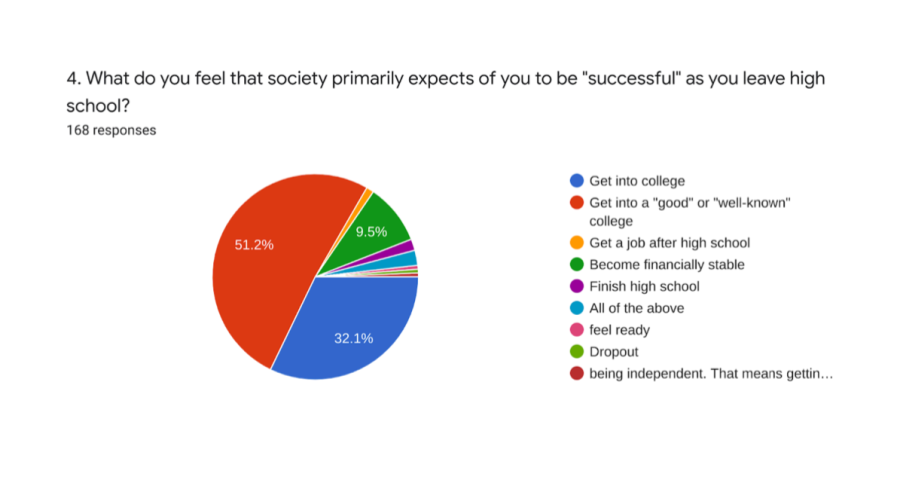Defining Success: Rindge Students Challenge College Expectations
83.3% of CRLS students feel that they are expected to go to college after high school.
February 6, 2022
Cambridge Rindge and Latin School was created as a bond between two worlds: the Rindge Technical School and the Cambridge Latin School. Today, as CRLS seniors endure the college application season, many students are confronted with big decisions about their future. This union is turbulently reopened, as students decide between four-year colleges or technical and vocational schools. Although they feel expected to do so, many students at CRLS are beginning to question, or even reject the idea of going to a four-year college. In a recent survey conducted by the Register Forum with 168 students, 83.3% reported that they primarily felt expected to go to college in order to be “successful.”
“It doesn’t even feel like a choice,” Ellen Davis, a junior at CRLS who is just beginning the college application and selection process, told the Register Forum. She expressed that she felt pressured to go to college by “the school and everyone else.” She also wishes there was less pressure to get into prestigious institutions. Exactly 51.2% of students in the survey reported that the primary way to be successful, according to societal expectations, is to get into a “good” or “well-known” college.
Imaje Edwards, a senior who is currently applying to several colleges, explained to the Register Forum that the system was a lose-lose situation: if you go to college, you have student loans. If you don’t go to college, she says, “you’ve failed.”
Edwards and Davis aren’t the only students who are beginning to challenge the pressures around them. The survey, which included 24 CRLS teachers, reported that 94.6% of students and 95.8% of teachers wished that these college expectations were different.
Perhaps one reason for this rejection is due to the substantial harm it causes students. In the aforementioned survey, 79.6% of students said that the societal expectations of success had a negative impact on their mental health. According to the American Psychological Association, teens reported that stress levels during the school year far exceeded what scientists believe to be healthy, and has even exceeded adults’ stress levels.
“I think a lot of people feel that they’re running and running and just can’t take a breath,” Molly Stone-Peterson ’22 told the Register Forum. For many of her classmates, especially students who are burnt out or have developed mental health issues from the pandemic, the process of being in school can be exhausting. Stone-Peterson is enrolled in the Early Childhood program at the Rindge School of Technical Arts (RSTA). She takes one class each year in her childcare specialty and consequently levels up into more advanced classes within the program each year. Next semester, she will be working as a teacher’s assistant in a Pre-K or Kindergarten class. By the time she graduates, she will have her lead teacher certification and will be a certified infant, toddler, and pre-school teaching assistant; Stone-Peterson could get a job right out of high school if she wanted. For her, it’s a way out of the overbearing college system: “I am not in that rat race and I have so much less stress because of it.”
CRLS History teacher and Watertown School Committee member Ms. Lily Read told the Register Forum, “I’ve had students who have gone through the automotive program and two years out of high school, are making more money than me with a masters degree. It’s because they’ve found their niche, they’ve found what they really want to do, and they pursued it.” Read explained that it is her mission to connect with each of her students to help them succeed by their own definition of success. She wishes the rest of the school had a similar perspective: “Everybody has a unique skill set and a unique perspective and to me, the role of public education is to maximize the opportunities for every kid’s skillset as best we can.” However, it is important to note that education still largely determines income levels. According to the US Bureau of Labor Statistics data from 2020, with each increasing level of education, salary and employment rates increase. In an interview with the Register Forum, Principal Damon Smith explained that he feels very strongly that students go to college if possible. If not directly after graduation, he hopes that students will go to college at some point in their lives. “Stopping at high school, that’s the end of your formal education? No, I don’t want that for you. It may not be right now, but I don’t want that for you.”
Smith also understands that many students would not like to pursue four-year college degrees. “The city of Cambridge provides great opportunities for students, and my job is to connect those students to those opportunities and then help them have more opportunities when they are graduating so that they are successful and they can lead a life of their own choosing.” According to the CRLS school profile, at least 1 in 10 students at CRLS have no plans after graduation. Principal Smith says that, for these students, “we have work to do.”









